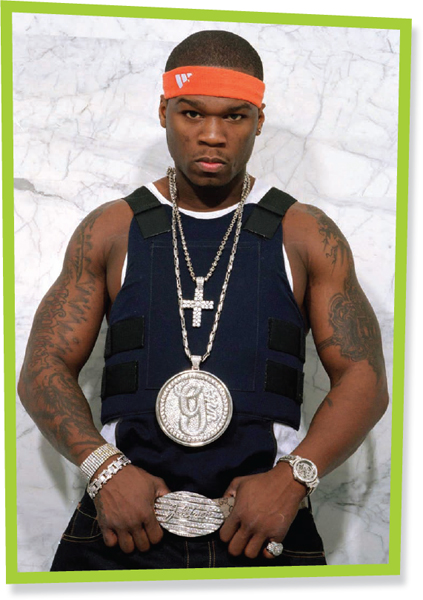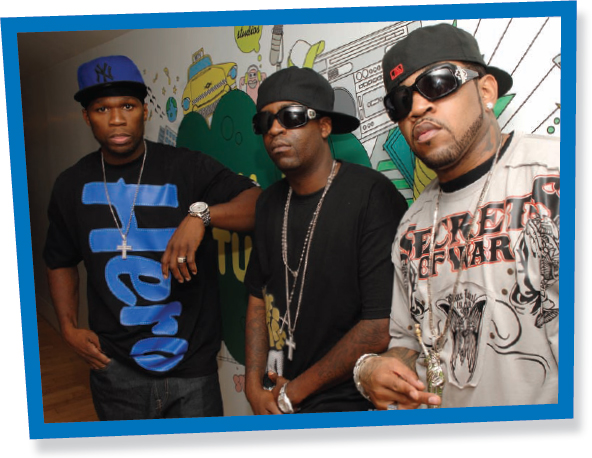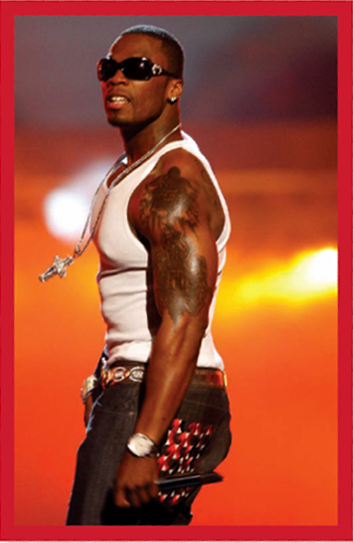

With three songs recently released to the radio and an upcoming deal with a major record label, 50 Cent was a rising rap star with a lot to lose as he sat in a car outside of his grandmother’s house in Queens, New York late one Wednesday morning in May 2000.
It is then the twenty-four-year-old musician’s dreams—not to mention his life—nearly ended. Seemingly out of nowhere, a man jumped out of the passenger seat of another vehicle, ran up to 50 Cent’s car, and began shooting his 9MM pistol into it. Nine bullets hit various parts of 50 Cent’s body. The bullets shattered his bones, and one of them exploded through the side of his face, blowing a hole in his jaw and embedding shrapnel in his tongue.

After fully recovering from being shot nine times, 50 Cent is shown in 2003 wearing a bulletproof vest.
“I was scared the whole time,” 50 Cent told MTV a few years after the shooting. “Ain’t nobody gonna tell you they ain’t scared in that situation. It’s a hit, man. You supposed to die in that situation…. I was looking in the rearview mirror like, ‘Oh, [expletive], somebody shot me in the face! It burns. Burns, burns, burns.”
50 Cent’s young son was inside the home and heard the gunshots. His great-grandmother phoned for help. Her grandson was rushed to the hospital and spent several hours in surgery while doctors removed bullets from his body. He spent thirteen days in the hospital. He spent several months after his release recovering from his wounds.
On the first day he was in the hospital, 50 Cent signed the paperwork on his music deal with Columbia Records. He knew if word of his being shot got back to the company, it might withdraw the offer. No company wanted to deal with a client who was going to be a headache. And being involved in a lifestyle that would lead one to get shot nine times certainly qualified one as a headache. 50 Cent knew this, so he had his grandmother bring him the documents for him to sign. His speedy signing turned out to be a smart move.
“As soon as word got out that I’d been shot, all my calls started going directly to people’s voicemails,” 50 Cent wrote in his 2007 book, 50 X 50: 50 Cent in His Own Words. “None of the people would call me back either. It didn’t take too long for me to figure out where I stood with them. I knew it was only a matter of time before they dropped me.”
Three days after he was shot, 50 Cent was scheduled to film a music video for one of his singles, “Thug Love.” The video, like the song, was to feature popular all-female singing group, Destiny’s Child. Releasing the video easily could have been the move that made him a household name. Of course, the video shoot didn’t happen. 50 Cent’s first major-label record, Power of the Dollar, also didn’t happen because of the shooting. Power of the Dollar was scheduled to be released in July by Columbia Records. But the company decided to drop 50 Cent from its roster, just as the rapper feared it would. 50 Cent’s career dreams appeared to be as traumatized as his body.

One of the many positive things that came from being dropped by Columbia Records was the formation of G-Unit which features Tony Yayo (middle) and Lloyd Banks (right).

Even though he had to take a step backward early in his career, 50 Cent found his way to the top of the rap/hip-hop world.
“There was no Plan B for me,” he told AOL Music in 2003. “If I don’t make music, I’m going back to the hood. I’ll sell crack. I’m gonna go back to sell crack if I can’t make it in the music business and that’s because that’s what I was doing before that…. I make music cuz it’s almost like I can escape everything I was involved in.”

One of 50 Cent’s biggest supporters is Russell Simmons who also is considered a hip-hop mogul.
Everything 50 Cent had been involved in before he began performing music read like the sad script to a tragic play. As he said, there were drugs. There also were murders, orphanhood, poverty, jail cells, and stabbings. Before music, little about 50 Cent’s life had been what one might consider a success.
Now, after the shooting, it appeared he was heading right back where he came from. He wrote in 50 X 50, “Here I had spent the last three years putting all my time and money into music, trying to leave the street behind me, and it was the street that was gonna stop me from finding success. …I was lying there all [messed] up, not knowing how my voice was gonna sound, whether or not I was gonna be able to walk right again. …That was the only time during the whole period that I cried—I truly felt in my heart that my music career was over.”
Somehow, 50 Cent remained optimistic that he still could make it—both in the music industry and in life in general. He told AOL Music, “You get shot nine times you feel like you here for a reason, ’specially when the guy shooting you is [right next to you]. … [Y]ou gotta feel God made the shells land where they land.”
Despite it all, 50 Cent didn’t give up on his dreams. Instead, he simply took a step backward. He returned to the streets, but this time it was with music on his mind. He had overcome too much adversity in his life to allow anything—even a near-fatal shooting—to stop him now.